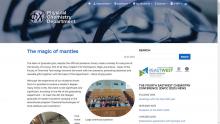O.V. Plotnikov started research work in electrochemistry of non-aqueous solutions, which then was developed to the unique scientific direction also known as Kyiv Electrochemical School in 1920-1930. Plotnikov together with his co-workers was first in the world, who could get aluminum by means of electrolysis at room temperature. Before 2nd World War Plotnikov’s scientific school made great contribution to the studies of electrolytic solution nature. At the same many famous researchers were working here, namely corr. member of NASU V.O. Izbekov, prof. M.O. Rabynovych, prof. Y.A. Fialkov, prof. Y.Y. Gorenbeyn, P.Z. Fisher, member of NASU Y.K. Delimarskyi and others.
In 1922 R&D lab was founded at the Department of Physical Chemistry, which transformed to the Institute of Chemistry at NASU lately (it was first chemical institute in Ukraine that became the basis of many other ones).
In 1945-1975 the department was headed by the follower of prof. V.O. Plotnikov, prof. O.K. Kudra, who is a famous of his fundamental studies about electrolytic formation of metalic powders and electrolytic decomposition of compounds in solutions.
In 1975-98 the department was headed by Doctor of Chemical Sciences, laureate of the State Prize of the USSR, Honoured Worker of Science and Technology of Ukraine, Honoured Professor of NTUU “KPI” Y. Fialkov. Prof. Yu.Ya. Fialkov created one of the most famous not only in the territory of the former USSR, but also outside its scientific schools, which was engaged in research in the field of physico-chemical analysis and physical chemistry of non-aqueous solutions. It was for this research that Yakov Fialkov was awarded the State Prize of the USSR in 1987. Under the leadership of Yu.Ya. Fialkovaya, 3 doctors and 52 candidates of sciences defended their dissertations. The result of almost half a century of scientific activity of Yu.Ya. Fialkovaya was more than 350 scientific works and inventions, among which 10 monographs (the most outstanding: “Double Liquid Systems”, Kiev, 1969; “Physical Chemistry of Nonaqueous Solutions”, Leningrad, 1973; “Fundamentals of Physical and Chemical Analysis”, Moscow, 1976, 1978; “Electric Deposition of Metals from Nonaqueous Solutions”, Kiev, 1985; “Solvent as a Control Tool for Chemical Process”, Leningrad, 1990; “Physical and Chemical Analysis of Liquid Systems and Solutions”, Kiev, 1992). Prof. Yu.Ya. Fialkov is widely known in the world not only as a physicochemical scientist, but also as a talented, bright and extraordinary populariser of chemical knowledge. His pen has more than ten science and art books for children, which have been translated into many foreign languages.
In 1998-2001 the department was headed by prof. V.L. Chumak, a student of prof. Yu.Ya. Violet.
From September 2002 to January 2009 the department was headed by prof. Yu.A. Maletin. He created a research laboratory of molecular energy storage devices – supercapacitors (MNEs) at the department.
From February 2009 to August 2010 the duties of the head of the department were performed by Ph.D., Assoc. HA. Rudnytska.
Since September 2010, the department is headed by Professor, Ph.D. O.E. Chyhyrynets.
Since 2013, a set of bachelors for the educational program “Chemical technologies of cosmetics and food additives” has been opened on the basis of the Department of Physical Chemistry of the Faculty of Chemical Technology.
The modern food industry is based on the widespread use of various food additives that regulate the taste of products, improve their appearance, shape the texture, extend the shelf life. Food additives are natural or synthetic substances, such as flavors, dyes, emulsifiers, stabilizers, thickeners, preservatives, antioxidants and the like. Mandatory components of various cosmetics are bioactive substances that are widely used in the cosmetics industry. Therefore, the training of specialists in the professional field “Chemical technologies of organic synthesis of cosmetics and food additives” is relevant today.
During their studies, students of the new educational program study such disciplines as “Chemical technology of food additives”, “Chemical technology of cosmetics”, “Methods of separation and identification of compounds”, “Bioorganic chemistry”, “Environmental safety in food and cosmetics”, “Static and dynamic stereochemistry ”,“ Reaction mechanisms ”, etc.
Specialists of the latest profile will be able to produce food additives and cosmetics, will know how to use them without harmful effects on humans, will have methods of controlling food additives in finished products. They are expected at the enterprises of food, perfume and cosmetics, chemical industry, in research institutions, public administration bodies that control the quality of products and their certification.

